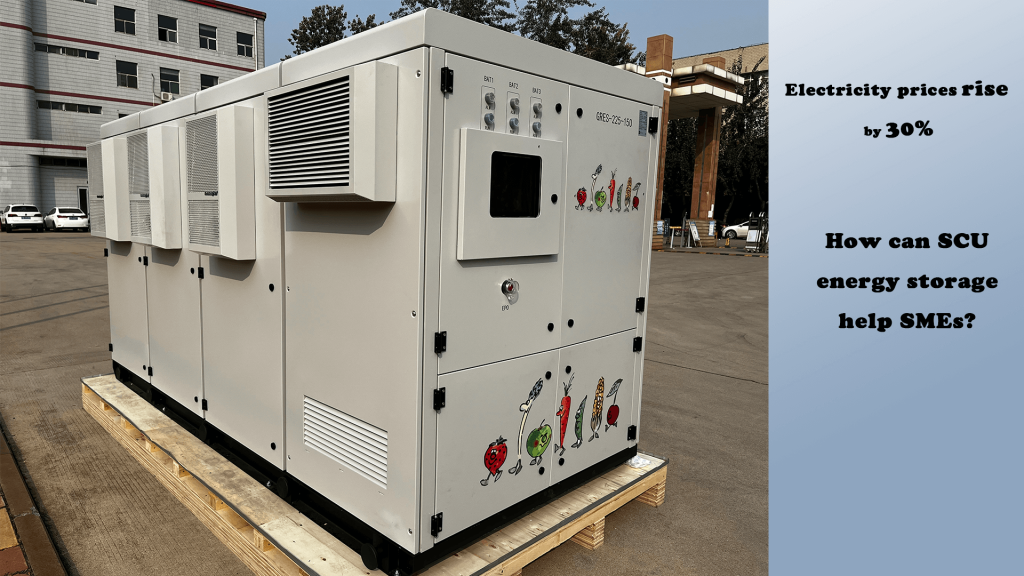Introduction
Picture this: You’re a small business owner, and you’re constantly on the lookout for ways to cut costs and increase profits. You’ve already installed energy-efficient lighting and HVAC systems, but your energy bills are still eating into your bottom line. That’s where battery energy storage systems come in.
Battery energy storage systems store excess energy generated by renewable sources, such as solar panels or wind turbines, for use when demand is high or when renewable energy sources aren’t producing enough. Not only can these systems save small businesses money on their energy bills, but they can also improve the reliability of their energy supply and reduce their environmental impact.

In this post, we’ll explore the future of energy storage systems in commercial settings, how to choose the right system for your business, real-world examples of battery energy storage system applications in small and medium-sized businesses, the benefits of using these systems, how to integrate them into your existing infrastructure, their impact on the environment, maintenance and upkeep, and their role in the transition to renewable energy.
Section 1: The Future of Energy Storage Systems in Commercial Settings
The demand for energy storage systems is on the rise, and the commercial sector is no exception. According to a report by the National Renewable Energy Laboratory, the installed capacity of energy storage systems in the United States is expected to reach 70 GW by 2035, with commercial and industrial sectors accounting for more than half of that capacity.
One reason for this growth is the increasing adoption of renewable energy sources, which are intermittent and require energy storage systems to ensure a steady supply of energy. Another reason is the increasing cost of energy, which is driving businesses to find ways to reduce their energy bills.
As the technology continues to improve and costs continue to decline, battery energy storage systems will become an even more attractive option for businesses looking to save money and reduce their environmental impact.
Section 2: How to Choose the Right Battery Energy Storage System for Your Business
Choosing the right battery energy storage system for your business can be a daunting task, but it’s important to take the time to do your research and find the system that best meets your needs.
First, consider your energy needs. How much energy does your business consume on a daily basis, and how much energy do you need to store? Next, consider your budget. Energy storage systems can be expensive, so it’s important to determine how much you can afford to spend.
Other factors to consider include the lifespan of the system, the manufacturer’s warranty, and the system’s efficiency. You may also want to consider whether the system is scalable, meaning it can be expanded as your energy needs grow.
Section 3: Real-World Examples of Battery Energy Storage System Applications in Small and Medium-Sized Businesses
Battery energy storage systems are already being used by small and medium-sized businesses across a variety of industries. For example:
– A winery in California uses a battery energy storage system to store excess energy generated by its solar panels, reducing its reliance on the grid and saving money on energy bills.
– A brewery in Colorado uses a battery energy storage system to store excess energy generated by its wind turbine, reducing its reliance on the grid and saving money on energy bills.
– A hotel in Hawaii uses a battery energy storage system to store excess energy generated by its solar panels, reducing its reliance on the grid and providing a reliable source of energy during power outages.
Section 4: The Benefits of Using Battery Energy Storage Systems in Your Business
The benefits of using battery energy storage systems in your business are numerous:
– Energy savings: By storing excess energy during low-demand periods and using it during high-demand periods, businesses can reduce their energy bills.
– Improved reliability: Battery energy storage systems provide a reliable source of energy during power outages or when renewable energy sources aren’t producing enough energy.
– Reduced environmental impact: By using renewable energy sources and storing excess energy, businesses can reduce their carbon footprint and help combat climate change.
Section 5: How to Integrate Battery Energy Storage Systems into Your Existing Infrastructure
Integrating a battery energy storage system into your existing infrastructure can be a complex process, but it’s important to ensure that the system is installed correctly to maximize its benefits.
First, you’ll need to determine the best location for the system, taking into account factors such as available space, proximity to renewable energy sources, and upkeep.
You’ll also need to ensure that the system is compatible with your existing electrical infrastructure and that the system’s capacity is sufficient to meet your energy needs.
Section 6: The Impact of Battery Energy Storage Systems on the Environment
Using battery energy storage systems can have a positive impact on the environment by reducing reliance on fossil fuels and reducing greenhouse gas emissions. However, it’s important to consider the environmental impact of the manufacturing and disposal of the batteries themselves.
Many battery manufacturers are working to improve the sustainability of their products by using recycled materials and developing more efficient manufacturing processes. Additionally, many batteries can be recycled at the end of their lifespan, reducing the amount of waste that ends up in landfills.
Section 7: What You Need to Know About Maintenance and Upkeep of Battery Energy Storage Systems
Proper maintenance and upkeep of battery energy storage systems is crucial to ensure their longevity and efficiency.
Regular maintenance tasks may include cleaning the system, checking for signs of wear and tear, and performing software updates. It’s also important to have the system inspected by a professional on a regular basis to ensure that it’s functioning properly.
If a problem does arise, it’s important to address it promptly to prevent further damage to the system.
Section 8: How Battery Energy Storage Systems Can Improve the Reliability of Your Business’s Energy Supply
Battery energy storage systems can provide a reliable source of energy during power outages or when renewable energy sources aren’t producing enough energy. This can be especially important for businesses that rely heavily on energy to operate.
By ensuring a steady supply of energy, businesses can avoid costly downtime and maintain their operations even during power outages or other disruptions to the energy supply.
Section 9: The Role of Battery Energy Storage Systems in the Transition to Renewable Energy
Battery energy storage systems play a crucial role in the transition to renewable energy by storing excess energy generated by renewable sources and providing a reliable source of energy during periods of high demand or when renewable sources aren’t producing enough energy.
As the demand for renewable energy continues to grow, battery energy storage systems will become an increasingly important component of the energy infrastructure, helping to ensure a reliable and sustainable energy supply for businesses and consumers alike.
Conclusion
Battery energy storage systems offer numerous benefits for small businesses, from reducing energy bills to improving reliability and reducing environmental impact. By taking the time to choose the right system for your business, integrating it into your existing infrastructure, and maintaining it properly, you can enjoy these benefits and position your business for success in the years to come.
